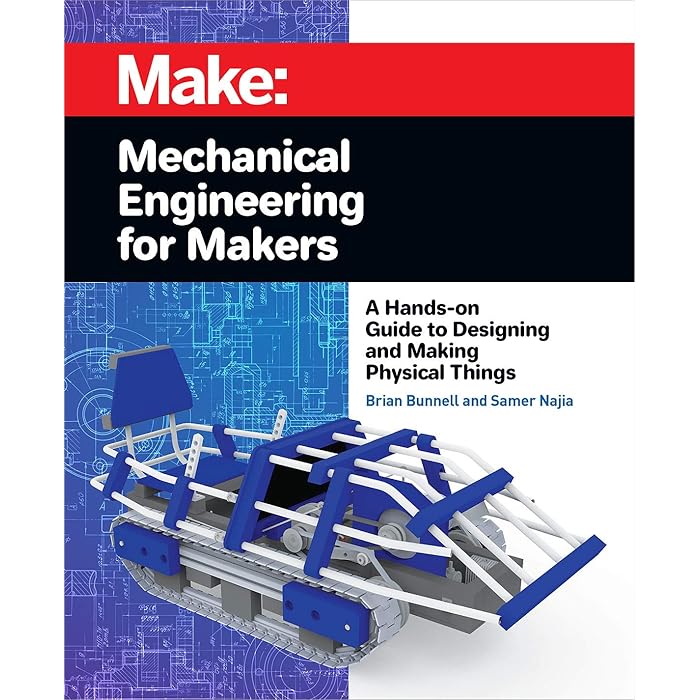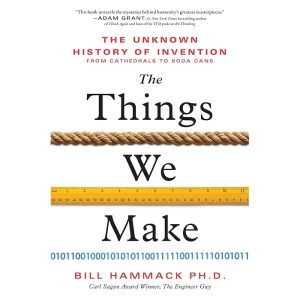Description
**”Mechanical Engineering for Makers”** is an exciting and practical approach to understanding mechanical engineering concepts, specifically tailored for hobbyists, tinkerers, and DIY enthusiasts. This concept focuses on taking the principles of mechanical engineering and applying them to real-world projects, often using accessible tools and materials.
Here’s a breakdown of how mechanical engineering can be approached in the context of making:
### 1. **Understanding Basic Mechanical Principles**
– **Forces and Motion:** Learn about basic forces like tension, compression, shear, and torque. Understanding these forces helps in designing structures or machines that will be durable and efficient.
– **Kinematics and Dynamics:** Understanding motion (speed, velocity, acceleration) and how forces cause motion (dynamics) helps in creating machines that move or actuate, such as robots or mechanical arms.
– **Energy and Power:** Know how to calculate the energy requirements of a system (e.g., how much power a motor will need to lift a certain weight or run a device).
### 2. **Materials and Manufacturing**
– **Material Selection:** Different materials behave differently under stress, and choosing the right material for your project is crucial. For example, aluminum is lightweight, while steel is stronger and more durable.
– **Manufacturing Techniques:** Understanding various fabrication techniques like CNC machining, 3D printing, laser cutting, and basic hand tools is vital for transforming designs into physical objects.
– **Tolerances and Fits:** Recognizing the importance of precision and tolerances when designing parts that must fit together or move.
### 3. **Mechanical Design and Analysis**
– **CAD Software:** Tools like SolidWorks, Fusion 360, or free alternatives like FreeCAD can help you design your projects digitally before building them.
– **Prototyping:** Quickly creating prototypes using 3D printing or laser cutting allows you to test ideas and refine designs before committing to larger, more expensive builds.
– **Finite Element Analysis (FEA):** This is an advanced method, but some makers use it to simulate how a design will behave under real-world conditions (stress, temperature, etc.), helping to improve the final design.
### 4. **Mechanical Systems**
– **Simple Machines:** Leverage simple machines like levers, pulleys, gears, and cams to create more complex systems (think robotics, automatic systems, or mechanical linkages).
– **Power Transmission:** Learn about different ways to transfer power between mechanical components, such as belts, gears, or chains. This is essential for moving parts in motors, vehicles, or machinery.
– **Actuators and Motors:** For makers, understanding how motors, servos, and pneumatics work is key to adding motion to your designs.
### 5. **Mechanical Assemblies and Testing**
– **Assembly:** Learn how to design parts that can be easily assembled and disassembled, keeping in mind things like tolerances, screw sizes, and fasteners.
– **Stress Testing:** Rigorous testing of your design for fatigue, durability, and performance under load can save time and effort in the long run.
### 6. **Popular Projects for Makers**
– **Robotics:** Build robots using motors, gears, and sensors. Apply concepts like kinematics and actuators to create robots that move and interact with the environment.
– **CNC and 3D Printing Projects:** Design and build custom parts using a CNC mill, lathe, or 3D printer. Many makers focus on functional, aesthetic, or even artistic projects using these machines.
– **Mechanical Gadgets:** Build mechanical clocks, puzzles, or automata. These projects can help you understand complex mechanical systems while still keeping things fun.
– **Vehicles:** From bicycles to go-karts to electric vehicles, understanding the principles of motion, braking, and gear systems is important for creating reliable and efficient machines.
### 7. **Learning Resources**
– **Books:**
– *The Art of Electronics* by Paul Horowitz and Winfield Hill (Great for understanding systems but can be applied to mechanical-electrical hybrid projects)
– *The Making of a Maker* by various authors (Focuses on practical and hands-on maker projects)
– *Engineering Mechanics: Dynamics* by J.L. Meriam and L.G. Kraige (Great for understanding motion and forces in mechanics)
– **Online Courses:**
– MIT OpenCourseWare (Mechanical Engineering Courses)
– Coursera (Mechanical Engineering Specializations)
– Udemy (Various practical design courses)
– **Communities:**
– Makerspaces and FabLabs: These are excellent physical locations where you can access tools and collaborate with others.
– Online Forums like Reddit’s /r/MechanicalEngineering or /r/Makers, where enthusiasts share advice, project ideas, and feedback.
### 8. **Key Skills for Makers**
– **Problem Solving:** Mechanical engineering often involves finding creative solutions to challenges, whether that’s fitting complex systems into small spaces or making a custom part that isn’t available off the shelf.
– **Hands-on Skills:** Building mechanical projects requires using hand tools, working with metals, woods, plastics, and electronics. Comfort with physical tools will help bring your designs to life.
– **Interdisciplinary Knowledge:** Often, mechanical engineering for makers combines elements from electrical engineering, programming, and even artistic design.
### Conclusion
Mechanical Engineering for Makers is all about using fundamental engineering principles to turn ideas into real-world projects. Whether you’re building a robotic arm, a mechanical clock, or designing a custom go-kart, mechanical engineering concepts help in understanding the forces, materials, and design processes that make it all work. The beauty of this approach is that it allows anyone to learn by doing, with hands-on projects and a focus on practical results.





Reviews
There are no reviews yet.